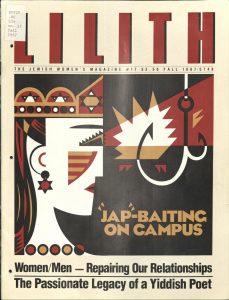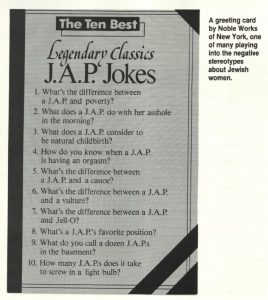Lilith’s fall issue in 1987, titled “JAP Baiting on Campus,” exemplifies the publication’s commitment to produce content directly relevant for young Jewish feminists of the time. As evident in the issue’s title, Lilith #17 unpacks the anti-Semitic slur “JAP” (Jewish American Princess) as it was popularized on college campuses in the mid 1980s.  The ethnic insult rests on the stereotype that all American Jewish women are materialistic, wealthy, socially inept, and sexually available. In a series of non-fiction articles, Lilith addresses the direct relationship between sexism, anti-Semitism, white supremacy, and violence in an effort to demonstrate to its readers that “JAP jokes” are not jokes at all, but an expression of age-old prejudice that endangers those targeted by such “humor.” The articles pay specific attention to Syracuse University, which the magazine notes as having a large and growing Jewish population and a growing anti-Semitic backlash problem. In his research of the anti-Semitic graffiti that popped up all over campus, sociology professor Dr. Gary Spencer documented and categorized the graffiti in the library carrels and told Lilith that the experience left him “literally shaken” and “nauseated” (9). Dr. Spencer noted that the graffiti ranged from sexist (“all JAPs are sluts”) to annihilationist (“give Hitler another chance” or “this is a warning to
The ethnic insult rests on the stereotype that all American Jewish women are materialistic, wealthy, socially inept, and sexually available. In a series of non-fiction articles, Lilith addresses the direct relationship between sexism, anti-Semitism, white supremacy, and violence in an effort to demonstrate to its readers that “JAP jokes” are not jokes at all, but an expression of age-old prejudice that endangers those targeted by such “humor.” The articles pay specific attention to Syracuse University, which the magazine notes as having a large and growing Jewish population and a growing anti-Semitic backlash problem. In his research of the anti-Semitic graffiti that popped up all over campus, sociology professor Dr. Gary Spencer documented and categorized the graffiti in the library carrels and told Lilith that the experience left him “literally shaken” and “nauseated” (9). Dr. Spencer noted that the graffiti ranged from sexist (“all JAPs are sluts”) to annihilationist (“give Hitler another chance” or “this is a warning to  American JEWS. We will kill you all”) to stand-alone slurs (“kikes”). The professor concluded that “these days, the anti-JAP graffiti have been replaced with vile anti-Semitic slogans….people no longer feel the need to hide an anti-Semitic comment behind a JAP joke” (7). Lilith here attends to an important issue that likely would have resonated with a lot of its audience: female college-age and educated Jewish feminists. By demonstrating the connection between sexism, anti-Semitism, and white supremacy, Lilith reinforces the importance of intersectional solidarity in Jewish feminism, while reminding readers that the fight for Jewish women’s safety and equality was not over yet.
American JEWS. We will kill you all”) to stand-alone slurs (“kikes”). The professor concluded that “these days, the anti-JAP graffiti have been replaced with vile anti-Semitic slogans….people no longer feel the need to hide an anti-Semitic comment behind a JAP joke” (7). Lilith here attends to an important issue that likely would have resonated with a lot of its audience: female college-age and educated Jewish feminists. By demonstrating the connection between sexism, anti-Semitism, and white supremacy, Lilith reinforces the importance of intersectional solidarity in Jewish feminism, while reminding readers that the fight for Jewish women’s safety and equality was not over yet.
The Feminist Poetry Movement
ENGL, WGSS, AMST 113
